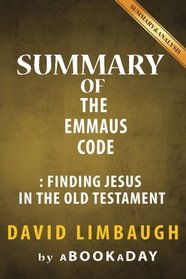Search -
Summary of The Emmaus Code: Finding Jesus in the Old Testament by David Limbaugh
Summary of The Emmaus Code Finding Jesus in the Old Testament by David Limbaugh
Author:
Warning: This is an independent addition to The Emmaus Code, meant to enhance your experience of the original book. If you have not yet bought the original copy, make sure to purchase it before buying this unofficial summary from aBookaDay. INTRODUCTION David Limbaugh begins his introduction with the story of the trial of the Apostle Paul, a for... more »
Author:
Warning: This is an independent addition to The Emmaus Code, meant to enhance your experience of the original book. If you have not yet bought the original copy, make sure to purchase it before buying this unofficial summary from aBookaDay. INTRODUCTION David Limbaugh begins his introduction with the story of the trial of the Apostle Paul, a for... more »
ISBN-13: 9781539124238
ISBN-10: 1539124231
Publication Date: 9/29/2016
Pages: 88
Rating: ?
ISBN-10: 1539124231
Publication Date: 9/29/2016
Pages: 88
Rating: ?
0 stars, based on 0 rating
Publisher: CreateSpace Independent Publishing Platform
Book Type: Paperback
Members Wishing: 0
Reviews: Amazon | Write a Review
Book Type: Paperback
Members Wishing: 0
Reviews: Amazon | Write a Review
Genres:




